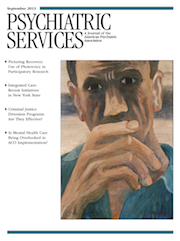Since the President’s New Freedom Commission on Mental Health mandated in 2003 a recovery orientation within mental health services, there has been increased demand and proliferation of peer-provided services throughout the United States. Preliminary research suggests that peer-delivered services are feasible and as effective as those delivered by nonpeers in similar roles. However, peer specialists continue to face several challenges, including unclear delineation of roles, infrequent supervision, and limited opportunities for training and ongoing professional development.
As part of an agencywide training effort to establish a recovery-oriented cognitive therapy treatment milieu, we conducted a pilot program with certified peer specialists (CPSs) to provide them skills for working with individuals who have schizophrenia (consumers). Recovery-oriented cognitive therapy emphasizes individualized goal attainment: long-term goals are broken down into intermediate and short-term goals, and specific strategies and techniques are then used to overcome obstacles (such as low energy and positive symptoms) to goal achievement. Accordingly, peers learned to use recovery-oriented cognitive therapy strategies to enhance and support consumers’ recovery efforts and use of therapeutic milieu. Training aimed to increase peers’ knowledge and application of recovery-oriented cognitive therapy strategies, determine the program’s acceptability to CPSs, and obtain feedback to shape future training initiatives.
Six CPSs and two facilitators (doctoral-level clinical psychologists) participated in the program, which took place in a community-based outpatient service. Training consisted of eight two-hour workshops over eight weeks. During the first four weeks, trainees were introduced to several topics, including the cognitive model and its application to schizophrenia, goal setting, empathic communication, and engagement. CPS trainees selected additional topics (such as problem solving and crisis deescalation) from a range of optional modules. The second four weeks involved developing case conceptualizations for peers’ consumers, identifying strategies based on the conceptualizations, and practicing recovery-oriented cognitive therapy techniques. Trainees completed a feedback questionnaire after the program to provide their perceptions of the utility and impact of the training.
All of the CPSs stated that the training program had affected the way in which they viewed themselves, their work, or their consumers. They reported as particularly useful the process of conceptualizing consumers in terms of their history, beliefs, and current behaviors. CPSs expressed confidence in their ability to use recovery-oriented cognitive therapy techniques and a willingness to implement them in their ongoing work. Overall, trainees found they were better able to empathize and engage with their consumers after training.
Trainees especially appreciated that the program was specifically designed for CPSs, noting that “[the] best part was interacting with those who had the same job description as myself,” and “[getting] a chance to work together as one.” One trainee proposed that future training include an opportunity to share how and why trainees became CPSs. Others echoed this desire to see the unique role of peers expanded in future programs. Peers also proposed that future recovery-oriented cognitive therapy training programs be even more interactive, meet more frequently, and have a greater total number of sessions.
The program facilitators also made some important observations. During the second half of the program, one CPS began to use the conceptualization framework to make sense of her own recovery. She identified the relationship between her personal history, beliefs, and associated behaviors and shared this with her fellow peers, who supported her disclosure and formulation. This trainee exhibited a sense of pride at having understood her illness and subsequent recovery, as well as having mastered a new skill. Facilitators also observed peers using recovery-oriented cognitive therapy strategies to manage their own stress. For example, two CPSs reported using imagery and deep breathing to manage a difficult situation at work.
The recovery-oriented cognitive therapy training program for CPSs was very well received. The pilot program suggests that peers are not only able to learn new ways to conceptualize and assist their consumers but are also able to use this information to make sense of and enhance their own continued recovery. In future training sessions, we advise placing more emphasis on self-conceptualization, which appears to be an effective way to help peers grasp the skill of conceptualization and experience a sense of mastery and self-efficacy. These benefits may also result in enhanced efficacy to help their consumers. We also suggest that future programs feature self-care techniques, along with concrete ways for peers to share these skills with others in recovery. Finally, where possible, we recommend implementing a longer training program, with more frequent and practical meetings, to maximize the opportunities for trainees to learn, practice, and apply skills in a supported context.

